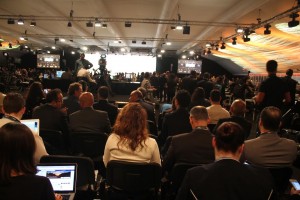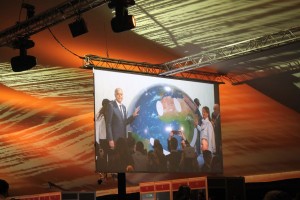By Laura Berry & Margherita Tommasini
“As we open COP 22, 100 parties have ratified the Paris Agreement. All together, we have made possible what they said it was impossible and we have done it with determination, we never gave up, this is a historic moment” ~Ségolène Royal, President of COP21
The official Opening Ceremony and first plenary session of the COP 22 climate negotiations in Marrakech, Morocco took place today, signifying the formal return to the negotiation table for Parties to the Paris Agreement. The President of COP 21, Ségolène Royal, introduced the session by celebrating the entry into force of the Agreement, which took place on November 5th.

She praised the 100 Parties that have already completed the ratification, and urged for the remaining parties to do so by the end of the year, reminding that immediate action is needed to “build the low-carbon strategies to bring global warming below 2°C”. She also reaffirmed the three guiding principles of her presidency: climate urgency, climate effectiveness and climate justice.
Following her remarks, Royal officially swore in Salaheddine Mezouar, the Moroccan Minister of Foreign Affairs, as President of COP 22 in a ceremony that invoked the symbolism of “lighting up Africa” with renewable energy. He spoke to Morocco’s history as a land of openness and a place to exchange dialogue across civilizations, as well as the innovative efforts that the people Morocco have taken in dealing with climate change. By holding COP 22 in Africa, Mezouar stressed the commitment of the entire continent to “embrace their destiny” in addressing climate change and improving resilience. In his speech, Mezour invoked an African proverb, “the sun does not ignore a village just because it is small,” stressing that the COP was responsible for the hope of all of humanity through tangible action through “win-win partnerships” and stakeholder engagement, transparency and consistency, and creation of innovative sustainable development models that can transform the world’s economies, including those of the Global South.

Afterwards, it was the first time for Mrs Patricia Espinosa to take the stage at the COP Plenary as Executive Secretary of the UNFCCC, as she was appointed early this year. She reiterated the urgency of the task, with the early entry into force of the Paris Agreement being a reason for celebration but also a reminder of the commitments Parties have pledged in the past year. The Executive Secretary wasted no time in glorifying the fast entry into force. On the contrary she highlighted that the implementation of the agreement should not be given for granted as we have to “embark on a path to change the course of two-hundred years of carbon development. In her address, she called upon making adaptation the higher priority of the negotiation process. She concluded by stating that inaction is not an option: “our work is far from done. […]Together we can deliver the promises the Paris Agreement made to the world”.
Next up, the Intergovernmental Panel on Climate Change (IPCC) Chair Hoesung Lee gave comments on the role of the scientific community in creating agreements based on sound science. He gave an update on the special IPC report requested by COP 21 to analyse the potential impacts of 1.5°C of warming, which will be delivered to the COP in 2018 before the facilitated dialogue to take stock of collective progress towards implementation of the Paris Agreement. Two other special reports will be published before 2019, and the 6th IPCC Global Synthesis will be published in 2022. Finally, Lee stressed that science is essential input for the work done at negotiations, and that the IPCC is ready to provide delegates with the knowledge of scientific community.
The last to address the plenary was the Mayor of Marrakech, Mr. Mohammed Larbi Belcadi. In his remarks, he praised the commitments to climate change adopted by Morocco and Marrakech, where local and municipal councils have joined their efforts and reinforced their commitment to environmental protection and sustainable development. In particular, Marrakech has adopted national policies for environmental protection, energy efficiency, and sustainable development with the goal of optimizing national resources and improving standards of living. Mr. Belcadi concluded by pointing out the tangible results of these actions: Marrakech’s green areas, the city’s center for water management and center for waste management, a clean transportation plan that includes electric buses, and the adoption of a natural gas power plan.
After the “historic” negotiations at COP 21 in Paris, COP 22 is being called “the COP of action.” However, given the lack of emphasis on the pre-2020 action necessary to keep warming well below 2°C with the aim of 1.5°C, it remains to be seen if negotiators will actually take the commitments made in Paris seriously. There is a real risk that negotiators and civil society groups will continue to consider the early entry into force of the Paris Agreement as the pinnacle of necessary action on climate change, when in reality the Parties to the Agreement must increase their ambition to cut carbon emissions and support the massive mitigation and adaptation financing of developing countries who bear a disproportionate burden of climate change impacts.
As a delegation, Earth in Brackets is committed to bringing the message of equity and climate justice to negotiators and civil society, so keep checking back here for updates and blog posts on major issues during COP 22.